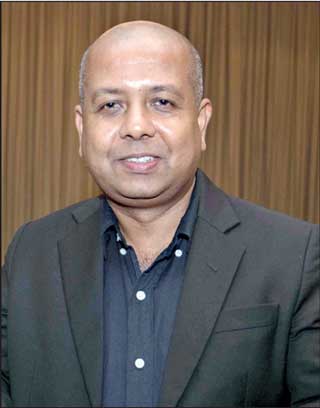Sunday Feb 22, 2026
Sunday Feb 22, 2026
Friday, 28 April 2023 00:05 - - {{hitsCtrl.values.hits}}
 |
| Global Agritourism Network (GAN) Chair Dr.Lisa Chase |
 |
| Global Agritourism Network (GAN) Member of the Auxiliary Committee for Promotion and Funds Harsha Udayakantha Peiris |
By Harsha Udayakantha Peiris
On 11 April, a momentous occasion was marked with the launch and online celebration of the Global Agritourism Network (GAN). The event garnered the attention of 676 registrants hailing from 81 different countries and 271 live participants from 55 countries. The inception of GAN represents a new dawn for the worldwide Agritourism industry, as it now possesses a cohesive and resounding voice to champion the promotion, advocacy, and advancement of the sector towards unprecedented heights of prosperity.
GAN comprises three statutory bodies that include the Steering Committee, the Executive committee, and the General Assembly. GAN currently operates 10 Auxiliary Committees chaired by international experts from nine countries. These committees include, Sustainable and Regenerative Agriculture and Agritourism chaired by David Gillespie of Canada, Policy and Advocacy chaired by Rose Wright of Australia, Promotion and Funds chaired by Senior Prof.(Dr.) Rohana P. Mahaliyanaarachchi of Sri Lanka, Research chaired by Dave Lamie of the U.S. and Corinne Stewart of France, World Agritourism Day chaired by Pandurang Taware of India, Webinars chaired by Dr.Lisa Chase, Communications ( website, emails, social media) chaired by Suzi Spahr, Sustainable and Regenerative Agriculture and Regenerative Agritourism chaired by David Gillespie and Education chaired by Marijke Dunselman.
“We are on our way to creating a truly global network. GAN’s mission is to support and advocate for a thriving Agritourism sector around the world. We have much work to do, but with such a pool of talented professionals so determined and united, I’m confident that GAN will be able to unleash the power to benefit the stakeholders globally,” says Dr.Lisa Chase. Being an esteemed Agritourism specialist from the University of Vermont Extension in the United States, she is also the inaugural chairperson of the Global Agritourism Network (GAN). Her remarkable efforts in organising the International Workshop on Agritourism in Vermont amidst the challenging times of the global pandemic in 2022 have contributed significantly to the establishment of this global initiative.
Sri Lanka falls behind in the global Agritourism sector due to the insufficient involvement of local stakeholders, role players, and Micro, Small and Medium (MSM) scale entrepreneurs in initiatives such as the Global Agritourism Network. The country›s lack of innovation, technology adoption, knowledge sharing, and branding efforts have hindered its progress in the field, leaving it far from establishing an authentic identity that can attract international agri-tourists. Without active participation and collaboration, Sri Lanka risks losing out on the tremendous economic opportunities that Agritourism can offer.
Agritourism, a form of tourism that involves visiting and participating in agricultural activities, is a growing trend worldwide. During the post COVID-19 era its progress is evolving. While there is a wealth of important and current information about Agritourism available, much of it is not available in the native languages of many regions where Agritourism is popular.
Instead, this vital information is often published in languages such as English, French, or Spanish. As a result, local and mostly rural farming communities in these regions with limited literacy to foreign languages may miss out on valuable information about Agritourism innovations, knowledge sharing pertaining to know-hows and branding.
This lack of dissemination of important information creates a knowledge management barrier that local authorities can help to mitigate. By taking steps to ensure that relevant information about Agritourism is available in local languages and accessible to a wider audience of MSMEs, authorities can support the growth and success of Agritourism in their region.
Overall, it is important for local communities and authorities to recognise the value of Agritourism and take steps to support its growth and development, including ensuring that vital information is accessible to all interested parties, regardless of language proficiency.
The growth of Agritourism in rural areas in Sri Lanka can provide significant opportunities for local communities, but it requires the support of local authorities to realise its full potential. To this end, the government should play an active role in promoting and branding distant and rural Agritourism ventures, particularly by showcasing local destinations at international events.
In addition to this, workshops should be conducted to educate rural communities and interested parties on the potential Agritourism markets in each area. Such workshops should take into account the unique locality, geography, fisheries & aquaculture as well as flora and fauna of the region.
Local media, including press and electronic outlets, should also publish more informative content on Agritourism in local languages to reach a wider audience.
The Sri Lanka Tourism Development Authority (SLTDA) should focus on strengthening its R&D team to explore the possibilities of implementing more innovative and sustainable Agritourism practices in the country. Such efforts will help to build an authentic brand image in the sector, enhancing Sri Lanka's reputation as a leading destination for Agritourism in the region. By working together, local authorities and communities can help to create sustainable and profitable Agritourism ventures that benefit all stakeholders involved.
As listed on United Nations World Tourism organisation’s (UNWTO) International Tourism Event Calendar, 16th May is recognised as World Agritourism Day.Some important time still remains for the local authorities to explore how the development of Agritourism and its related activities can be effectively promoted through the advancement of modern agri-business management strategies. The aim is to foster the diversification of local economies, thereby paving the way for increased economic growth and sustainability.
At the core of this lies the involvement of several key personnel, each playing a crucial role in driving this development forward. These responsible individuals must be guided by sound development principles, which will ensure that progress is both impactful and sustainable.
As the global community becomes increasingly conscious of the importance of environmental sustainability, the need for innovative solutions that promote ‘Sustainable Agriculture and Tourism Practices’ is more pressing than ever. It is imperative therefore, the authorities establish a robust platform for experts to exchange their knowledge, deliberate on best practices, and foster innovative ideas to disseminate crucial information on optimal practices.This will not only educate Agritourism stakeholders at the micro, small, and medium levels, but also encourage the emergence of new Agritourism entrepreneurs in rural and remote areas.By doing so, we can cultivate a distinct brand of Agritourism that fosters sustainable economic growth while promoting environmental conservation.